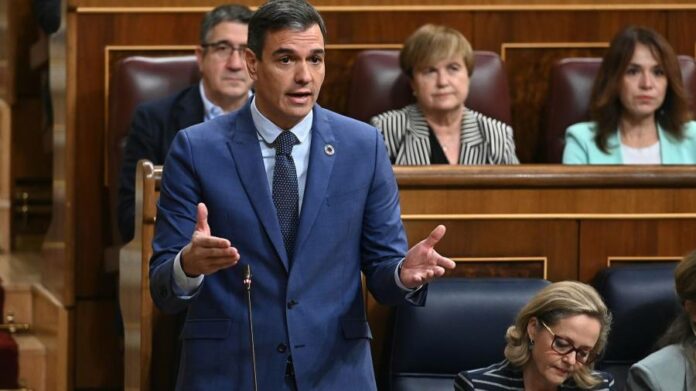The European Central Bank has criticised Spain’s proposed windfall tax on its banks, warning it could damage the capital position of lenders, disrupt monetary policy and prove difficult to enforce.
Spain’s government should carry out an impact assessment on the bank tax and clarify several areas that are unclear, the ECB said in a non-binding legal opinion that raised similar objections to those it has issued about comparable moves in other EU countries.
Pedro Sánchez’s Socialist-led coalition government wants to use the temporary measure to raise a total of €3bn from lenders that would be spent on cushioning the impact of the surge in energy prices triggered by Russia’s invasion of Ukraine.
Several other EU countries have also announced extra taxes on lenders this year to cover the cost of Europe’s energy crisis. Hungary plans to impose an extra levy of 10 per cent on banks’ domestic revenues this year and 8 per cent next year, while the Czech Republic plans a 60 per cent tax on any “excess profits” by banks, defined as more than a fifth above the average over the past four years.
But the ECB warned Spain’s planned 4.8 per cent tax, charged on banks’ income from interest and commissions for two years, could be levied on an institution even if it was lossmaking, as it does not take into account provisions for bad loans or operational expenses.
“If the ability of credit institutions to attain adequate capital positions is damaged, this could endanger a smooth bank-based transmission of monetary policy measures to the wider economy,” the ECB said in an opinion signed by its president Christine Lagarde, and dated November 2.
The central bank recommended Madrid carry out “a thorough analysis of potential negative consequences for the banking sector” to detail its impact on profitability, financial stability, competition and resilience of banks as well as on the supply of credit.
Spain’s government — whose tax will hit roughly 10 lenders, including the country’s two largest banks, Santander and BBVA — has argued rising interest rates are yielding “extraordinary” profits for the sector.
The parliament is likely introduce the tax, due to cover revenues made in 2023 and 2024, despite the ECB’s concern.
One Spanish government official stressed the ECB’s opinion was non-binding while noting the central bank did not come out firmly against the proposal.
The official said the issues where the ECB called for clarification or more analysis had been taken into account by the government as it developed the windfall tax proposal, which was announced in July.
Santander, BBVA and CaixaBank, Spain’s biggest lenders, all declined to comment, as did the main trade association for the country’s banks.
Commercial lenders have said the fact the government wants to stop them passing the cost of the tax on to clients is incompatible with EU rules and potentially destabilising.
The ECB said this aspect of the proposal “might generate uncertainty, as well as related operational and reputational risks for those institutions”. It added: “The ECB generally expects credit institutions, in accordance with international best practices, to consider and reflect in loan pricing all relevant costs, including tax considerations, when relevant.”
It also raised doubts about whether this could even be enforced, saying: “Considering all the different circumstances that may cause an increase in prices in the current context of interest rate rises, inflation or deteriorating risk premia, it appears to be difficult to differentiate whether the temporary levy would actually be passed on to clients or not.”
Calling for Madrid to clarify a “discrepancy” in the draft law on exactly what part of a bank’s income the tax would be levied on, the ECB raised concern over whether its reference to Banco de Espana’s duty to comply would “amount to the conferral of any new task” on the national central bank.
The ECB’s non-binding opinions have been ignored by the Spanish government before. This year Madrid pressed ahead with imposing a €1,000 ceiling on cash payments that can be made involving businesses, a measure to curb black market activity, despite the ECB saying in March it was “disproportionate”.






